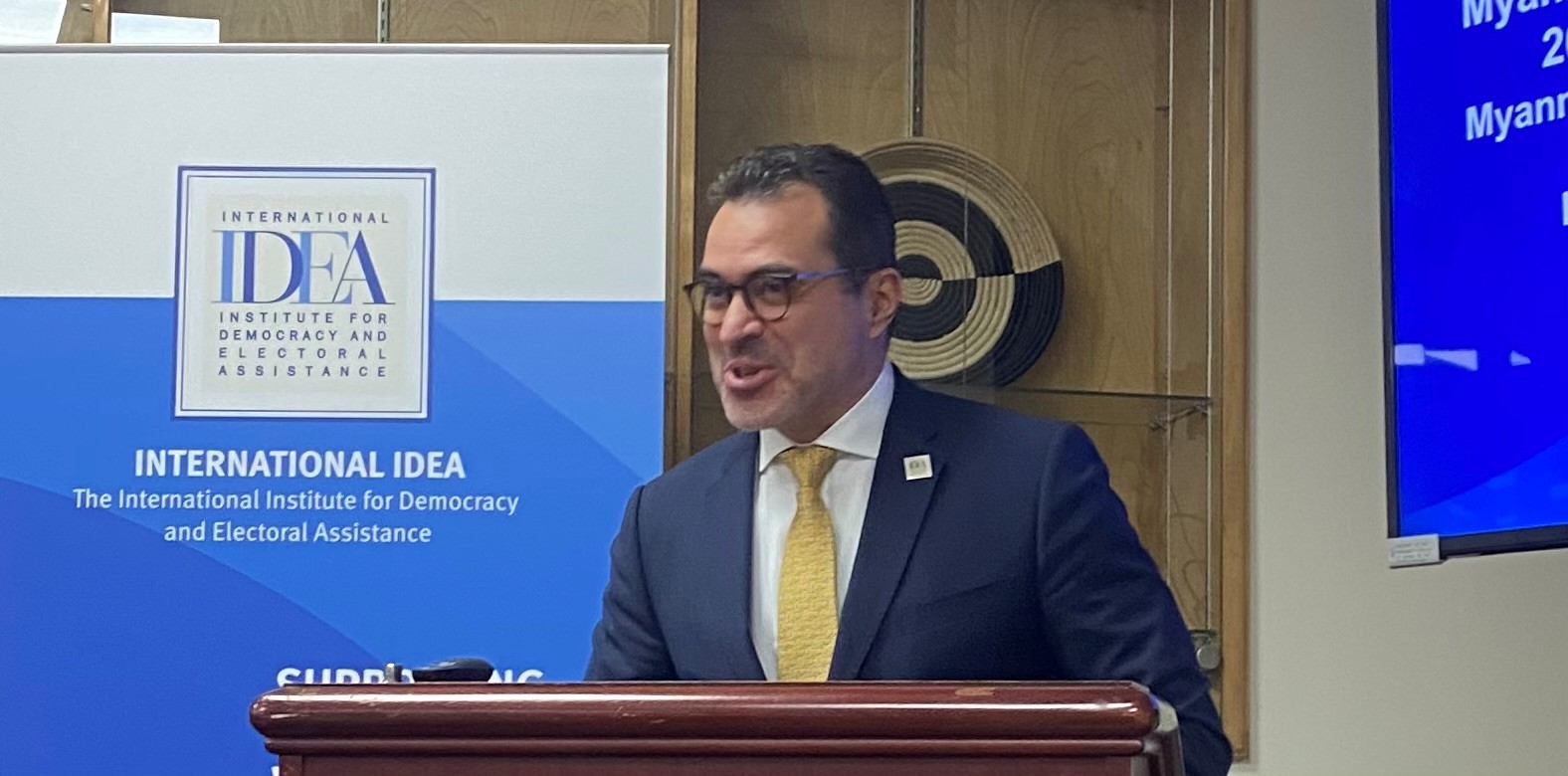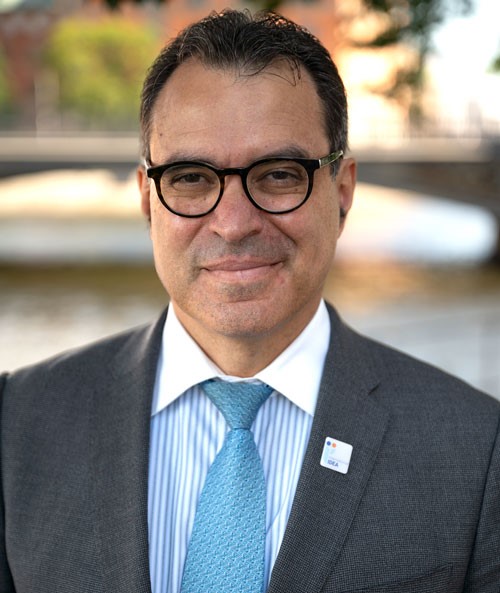Restoring democracy and legitimate government in Myanmar and International IDEA’s support

Briefing to IDEA's Member States on Restoring democracy and legitimate government
in Myanmar and International IDEA’s support. Image Credit: International IDEA
Friends, Excellencies,
Good afternoon to all of you and thank you for being here.
I’m happy and honored to have this opportunity to discuss with you the situation in Myanmar, as well as the work that International IDEA continues to do to support the democratic forces in Myanmar and, ultimately, the restoration of democracy in the country.
Let me first acknowledge the presence of a few people in the room. It is my pleasure to welcome the Permanent Representative of Myanmar to the United Nations, Ambassador Kyaw Moe Tun, as well as Mr U Zaw Thein, an elected member of parliament from Myanmar who had to flee from the country in fear of persecution, and Ms Wai Wai Nu, who is a well-known young change-maker, women’s rights and Rohingya activist, human rights defender and representative of the young generation and civil society that will be the drivers of change in the years to come.
I also want to also say that we owe the opportunity to have this conversation to my colleague Dr Marcus Brand, who continues to lead our Myanmar program with the same talent and belief in the democratic future of Myanmar, as when he was in Yangon. I would also like to introduce you to my colleagues Dr Annika Silva-Leander, head of our North America Office in Washington DC, and Amanda Sourek, Outreach Officer in our New York Office, who will play a key role in nurturing our connection with the UN Missions of our Member States, which is a relationship that IDEA cherishes and regards as vital.
IDEA has supported democracy in Myanmar since 2002. We established a country office in 2013 and grew to be among the leading assistance providers on electoral reform, constitutional development and parliamentary capacity building in recent years. By the time of the 2020 elections, the office had developed into our largest ever country office.
However, the coup forced us to suspend and terminate some of our programmes, and relocate all of our staff, international and Myanmar nationals, out of the country to keep them out of harm’s way. We are more than grateful to our donor-partners, Sweden, Finland, Norway and Luxembourg, for allowing us to continue our democracy support under these challenging conditions. In a few minutes I will let Marcus present you with some of the key findings as well as a summary of our activities, in the hope that we will be able to continue and expand our partnership for restoring democracy in Myanmar with some of you in the future.
Yet, I cannot resist to use this occasion to reflect more broadly on some of the things that we have learned in the year since the military coup in Myanmar. We have learned, for starters, that it is not easy to turn back the clock once democracy, however imperfect, has started to grow roots in a society. We have seen that young people in Myanmar, in particular, are simply unwilling to roll over, accept military rule and give up on their most basic civil and political rights, which they got to exercise for over a decade. It doesn’t work like that. It may seem quaint in an age of cynicism, but through their immense courage, through their determination to stand up to their powerful aggressors, the people in Myanmar –as the people in Ukraine—have shown that there are principles worth dying for.
It is very much an open question if the same devotion to democratic principles is to be found in many of the democracies represented here, including my own country, Costa Rica, where those principles have become part of the daily routine and, as such, are taken for granted. The silly games of polarization, the tricks to erode checks and balances, the irresponsible cries of electoral fraud without proof, all the pettiness that seems to afflict democratic politics all over the world, are luxuries unavailable to those that are putting their lives on the line to make sure that democracy survives against all odds in places like Myanmar and Ukraine. The sacrifices that they are making in impossible situations so that democracy lives on, should make us, that live under stable democratic systems, more willing to call out those that play fast and loose with democratic principles as though they didn’t matter.
But we have learned more than that. In the terminal refusal of the people of Myanmar to be cowed by their authoritarian rulers we have seen the ostensible proof that democracy is not a Western construct, but a universal aspiration. I never fail to notice that the voices that say that liberal democracy is no more than a Western concept are always those of highly repressive governments. We never hear dissidents, or prisoners of conscience, or harassed journalists, who are as part of the same culture as the government that persecutes them, resorting to the same brand of cheap relativism.
The truth is that the values that move the people in Myanmar to resist military rule; the values that people are getting shelled on for in Kyiv today; the values the impel millions of citizens across Africa and Latin America to stand in line for hours to cast their votes, are ultimately the same ones that sustain democratic systems everywhere. They are the beliefs that human beings are endowed with a sacred right to elect authorities in free and fair elections, to speak up and dissent, to share information with others and organize in civic groups free from coercion, among many others. Those values are universal because they protect the dignity of human beings and their ability to choose the life they deem valuable better than any other political arrangement.
And much as we would like to think that, as Martin Luther King had it, the arc of the moral universe ultimately bends in the direction of justice, the truth is that the struggle for democracy is never a linear process. There are always setbacks, and there was a huge one in Myanmar. These are long, complicated journeys. Let us not forget that it took the United States two centuries to grant full political rights to the Afro-American population, and that it took Europe eight centuries to move from a parliament made up of nobles to a parliament elected by universal suffrage. These things take time. And they are not for the faint-hearted.
A crucial practical implication flows from this. Those of us that believe in the cause of democracy in Myanmar –from us at International IDEA to the international donors that can support this work, to those that have lent their political weight to the legitimate authorities of Myanmar—need to commit ourselves for the long run, because this is not going to be fast or easy. Despite the great progress made by Myanmar’s democratic forces towards developing a blueprint for the country’s future, we should make no mistake – even if the military were to disappear from the scene tomorrow, the road towards an inclusive democracy in Myanmar will be a long and fraught one. We must be willing to support this cause for the long-haul or we’re just not sincere enough. It is that long-term commitment that contains the measure of our devotion to the cause of democracy in Myanmar. It is that long-term commitment that is our true homage to those that, in Yangon as much as in Kyiv, are paying the ultimate price to defend democracy, men and women that often have no other grave but our memory.
Some of you may be wondering why I am giving you this earful at what was supposed to be a rather technical briefing. Well, it may be because for me the struggle for democracy is personal. I am the son of a Cuban exile. Even though I had the immense fortune of being born in Costa Rica, for my family the absence of democracy and the terrible effects of authoritarianism on the lives of its victims are not abstractions.
It is partly out of this very personal conviction that I will make sure that IDEA remains committed in the long term to supporting the restoration of democracy in Myanmar. I will do everything I can so that IDEA plays a catalytic role in providing assistance, in a nimble and flexible way, to the people that are fighting in Myanmar and abroad for the values we share, particularly the National Unity Government. I will try my best so that IDEA, alongside the rest of the international community, does its part to prepare the legitimate authorities to take over state responsibility in the future and to help them to rebuild the country in a way that genuinely reflects the people’s aspirations and needs, without discrimination or favour to any particular group.
Most of all, I will make sure that, at the UN and elsewhere, IDEA reminds everybody that the struggle for democracy in Myanmar matters to the rest of the world, because the values that it embodies are not just Western values but universal ones. We will convey the message that the authoritarian tragedy that is unfolding in Myanmar is an affront to all of us that believe in democracy; that we will not abandon this fight because it is, indeed, very personal.
Thank you.
